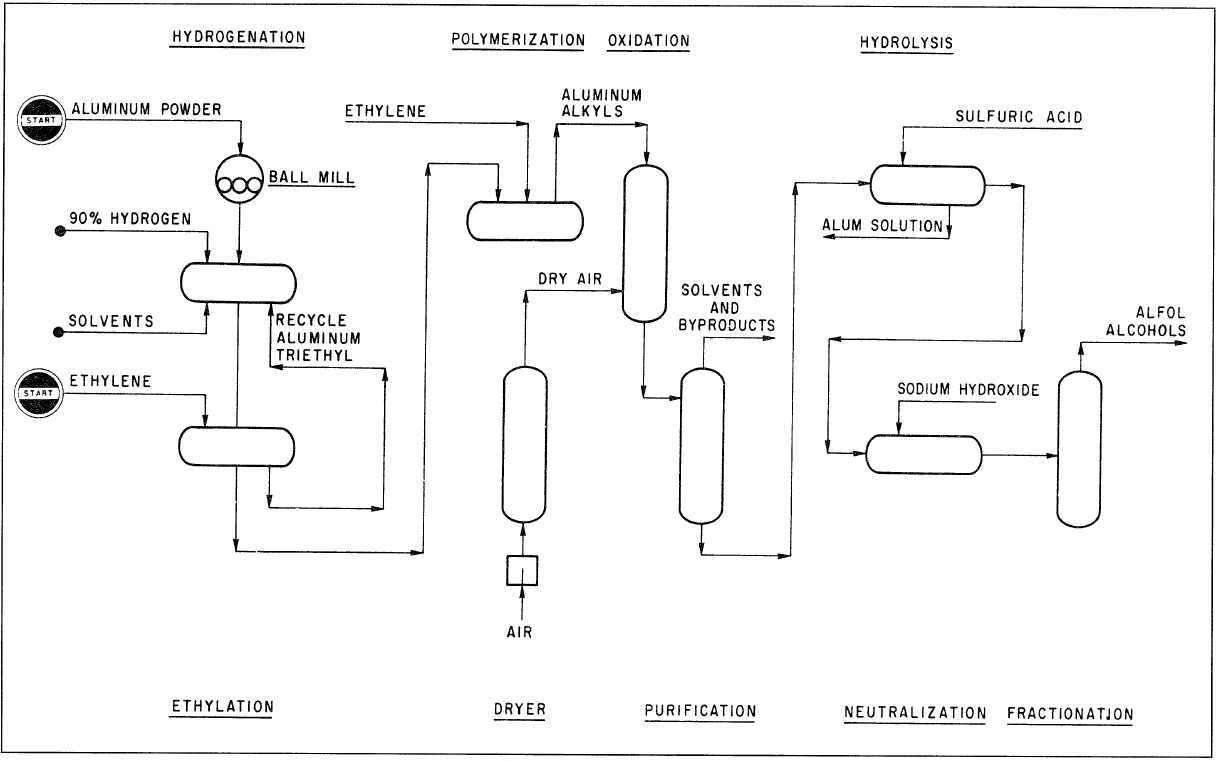


 علم الكيمياء
علم الكيمياء 
 الكيمياء التحليلية
الكيمياء التحليلية 
 الكيمياء الحياتية
الكيمياء الحياتية 
 الكيمياء العضوية
الكيمياء العضوية 
 الكيمياء الفيزيائية
الكيمياء الفيزيائية
 الكيمياء اللاعضوية
الكيمياء اللاعضوية 
 مواضيع اخرى في الكيمياء
مواضيع اخرى في الكيمياء
 الكيمياء الصناعية
الكيمياء الصناعية |
Read More
Date: 29-8-2017
Date: 21-8-2017
Date: 23-7-2017
|
LINEAR ALCOHOLS
Linear alcohols (Cl2-C26) are important chemicals for producing various compounds such as plasticizers, detergents, and solvents. They are also produced by the oligomerization of ethylene using aluminum alkyls (Ziegler catalysts). The Alfol process (Figure 1.1) for producing linear primary alcohols is a four-step process. In the first step, triethylaluminum is produced by the reaction of ethylene with hydrogen and aluminum metal:

In the next step, ethylene is polymerized by the action of triethylaluminum at approximately 120°C and 130 atmospheres to trialkylaluminum. Typical reaction time is approximately 140 minutes for an average C12 alcohol production:


Figure 1.1. The Alfol process for making even-numbered straight-chain alpha alcohols.
The oxidation of triethylaluminum is carried out between 20–50°C with “bone dry” air to aluminum trialkoxides.

The final step is the hydrolysis of the trialkoxides with water to the corresponding even-numbered primary alcohols. Alumina is coproduced and is characterized by its high activity and purity:

Linear alcohols in the range of Cl0–Cl2 are used to make plasticizers. Those in the range of Cl2–Cl6 are used for making biodegradable detergents.
They are either sulfated to linear alkylsulfates (ionic detergents) or reacted with ethylene oxide to the ethoxylated linear alcohols (nonionic detergents). The Cl6–Cl8 alcohols are modifiers for wash and wear polymers. The higher alcohols, C20–C26, are synthetic lubricants and mold release agents.



|
|
|
|
علامات بسيطة في جسدك قد تنذر بمرض "قاتل"
|
|
|
|
|
|
|
أول صور ثلاثية الأبعاد للغدة الزعترية البشرية
|
|
|
|
|
|
|
في مستشفى الكفيل.. نجاح عملية رفع الانزلاقات الغضروفية لمريض أربعيني
|
|
|